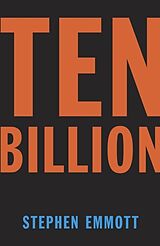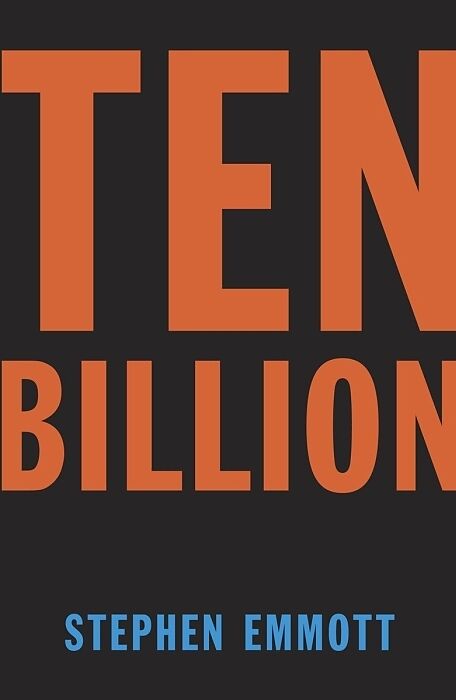Ten Billion
Einband:
Kartonierter Einband
EAN:
9780345806475
Untertitel:
Englisch
Autor:
Stephen Emmott
Herausgeber:
Random House LLC US
Anzahl Seiten:
216
Erscheinungsdatum:
10.09.2013
ISBN:
0345806476
Deforestation. Desertification. Species extinction. Global warming. Growing threats to food and water. The driving issues of our times are the result of one huge problem: Us. As the population continues to grow, our problems will increase. And this means that every way we look at it, a planet of ten billion people is likely to be a nightmare. Stephen Emmott, a scientist whose lab is at the forefront of research into complex natural systems, sounds the alarm. TEN BILLION is a snapshot of our planet, and our species, approaching a crisis, and a stark analysis of where this leaves us. TEN BILLION is not another climate book. TEN BILLION is a book about us.
ldquo;A rallying call to arms. . . . Succinct and righteously pessimistic. . . . [with] an indispensible message to galvanize a world in potential crisis.”
—Kirkus Reviews
Praise from the U.K. for TEN BILLION
“The cumulative effect of [Emmott’s] uncluttered, unadorned prose, buttressed with graphs and illustrations, is significant. . . . A spine-chilling warning of the environmental disaster that awaits the Earth.”
—The Daily Telegraph (4 stars)
“Powerful. . . . Compelling. . . . The shift in thinking that will be needed if we are to prepare ourselves for living in a different world begins with reading Emmott's indispensable book.”
--The Guardian
"A stark, simple and short warning about the coming catastrophe, which [Emmott] feels is inevitable, resulting from human overpopulation and over-exploitation of the world’s resources. . . . A valuable contribution to rekindling a discussion on global population that has waxed and waned in the two centuries since Thomas Robert Malthus first brought the issue to public attention."
--Financial Times
Acclaim for the theater production of TEN BILLION, performed by Stephen Emmott at London's Royal Court Theatre:
"This an hour of Matrix moments, of reminders of what underlies our daily lives. It's freeing to face the facts as well as alarming. . . . It informs, unsettles, provokes. Job done." --The Times (London)
"Professor Emmott argues his case with an implacable logic. He is quiet, humane and deeply concerned and when he says . . . 'I think we're fucked,' you have to believe him." --The Guardian (London)
"A new kind of talk . . . a daring one-man show in which Emmott desperately strives to pull together into one grand and devastating portrait the many ways we are impacting the planet." --New Scientist
Autorentext
Stephen Emmott is head of Computational Science at Microsoft Research. He leads a broad scientific research program, at the center of which is an interdisciplinary team of new kinds of scientists, and a new kind of laboratory, in Cambridge, England, pioneering new approaches to tackle fundamental problems in science. His lab’s research spans from molecular biology, immunology, and neuroscience, to plant biology, climatology, biogeochemistry, terrestrial and marine ecology, and conversation biology, as well as the new fields of programming life and artificial photosynthesis. Stephen is also Visiting Professor of Computational Science, University of Oxford; Visiting Professor of Biological Computation, University College London; and Distinguished Fellow of the UK National Endowment of Science, Technology and the Arts.
Leseprobe
This is a book about us.
It’s a book about you, your children, your parents, your friends. It’s about every one of us. It’s about our failure: failure as individuals, the failure of business, and the failure of our politicians.
It’s about the unprecedented planetary emergency we’ve created.
It’s about the future of us.
Earth is home to millions of species.
Just one dominates it. Us.
Our cleverness, our inventiveness, and our activities have modified almost every part of our planet. In fact, we are having a profound impact on it.
Indeed, our cleverness, our inventiveness, and our activities are now the drivers of every global problem we face.
And every one of these problems is accelerating as we continue to grow toward a population of ten billion.
In fact, I believe we can rightly call the situation we’re in right now an emergency—an unprecedented planetary emergency.
This is the reason I have written this book.
I am a scientist.
I lead a lab, in Cambridge, England, which is home to a unique collection of amazing young scientists. We conduct research into complex systems, including the climate system and ecosystems, as well as the impact of us humans on the earth.
Science is ultimately about understanding. And this is what we try to do: to understand the earth’s climate, and the behavior of the earth’s terrestrial and marine ecosystems—from its microbial communities to its forests—and to predict how these vital planetary systems will respond to change.
Change caused by us.
We humans emerged as a species about 200,000 years ago. In geological time, that is really incredibly recent.
Just over 10,000 years ago, there were one million of us.
By 1800, just over two hundred years ago, there were one billion of us.
By 1960, fifty years ago, there were three billion of us.
There are now over seven billion of us.
By 2050, your children, or your children’s children, will be living on a planet with at least nine billion other people.
Sometime toward the end of this century, there will be at least ten billion of us. Possibly more.
How did we get to where we are now?
We got to where we are now through a number of civilization- and society-shaping “events”; most notably, the agricultural revolution, the scientific revolution, and—in the West—the public-health revolution.
These events have fundamentally shaped how we live, and have fundamentally shaped our planet. Their legacy will continue to shape our future. So we need to look at our growth and activities through the lens of these developments.
By 1800 the global population had reached one billion.
One of the principal reasons for this growth was the invention of agriculture. The “agricultural revolution” enabled us to go from being hunter-gatherers to highly organized producers of food, and allowed our population to grow.
A useful way to think of the development and importance of agriculture is in terms of at least three agricultural “revolutions.” The first took place over 10,000 years ago. This was the domestication of animals and the cultivation of plant types.
The second agricultural revolution was between the fifteenth and nineteenth centuries. This was a revolution in agricultural productivity and the mechanization of food production.
The third happened between the 1950s and 2000s; the so-called “green revolution.”
But there’s another story here: the start of a fundamental transformation—of land use—by humans.
One hundred and thirty years later, we had grown to two billion.
It was 1930. The impact of another revolution—the industrial revolution&m…

Leider konnten wir für diesen Artikel keine Preise ermitteln ...
billigbuch.ch sucht jetzt für Sie die besten Angebote ...
Die aktuellen Verkaufspreise von 6 Onlineshops werden in Realtime abgefragt.
Sie können das gewünschte Produkt anschliessend direkt beim Anbieter Ihrer Wahl bestellen.
Loading...
Die aktuellen Verkaufspreise von 6 Onlineshops werden in Realtime abgefragt.
Sie können das gewünschte Produkt anschliessend direkt beim Anbieter Ihrer Wahl bestellen.
| # | Onlineshop | Preis CHF | Versand CHF | Total CHF | ||
|---|---|---|---|---|---|---|
| 1 | Seller | 0.00 | 0.00 | 0.00 |
